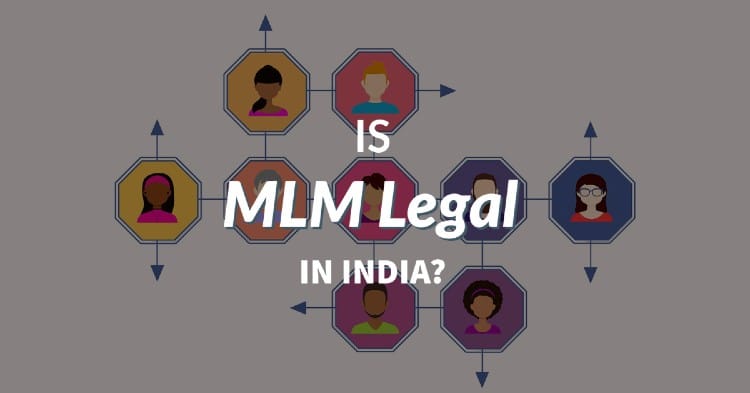
There are many claims against multi-level marketing (MLM). People are really confused about whether they should invest in any MLM companies or not. The recent scams have covered the MLM industry with questions and claims but this article will help you to answer all queries like whether MLM marketing is legal in India or not?, whether should you invest in any MLM schemes or not?, how to identify the fake and genuine MLM company? And many more.
Multi-level marketing is a very common business strategy. You, me, and every second person have heard of the schemes from some acquaintance to invest some fixed amount and further join any members in the schemes or make a distribution chain to sell the products and add the member to earn profit as a commission.
What is MLM (Multi-Level Marketing)?
Multi-level marketing or network marketing is the marketing strategy in which the companies make a workforce chain to sell the products and services through direct selling or chain distribution. The structure has non-salaried staff, it works on the profit principle. The staff is required to make the customer or sell the products and derive profit as a commission through it. It is a controversial business strategy.
Why Does the MLM Industry Have Extensive Popularity?
The MLM industry is so much in the air because the industry promises to give you huge profit returns in a short period of time. In addition, it does not require any specific educational qualification eligibility means the industry has very low entry barriers which made it easy to penetrate. The MLM industry is eye-catching because it offers quick returns and remains a lucrative growth opportunity in the near future.
Is Multi-Level Marketing or Network Marketing Legal in India?
MLM is legal in India with few exceptions. Some schemes in multi-level marketing are considered as a trap. The government has listed a few exceptions to save innocent customers from falling into the trap.
The following schemes are considered illegal under the Prize Chits & Money Circulation Schemes (banning) Act 1978 and Direct Selling Guidelines 2016 by the Indian government.
Pyramid Schemes
These schemes start with one person and one person joins hundreds of others making a structure of the pyramid. The RBI states that MLM marketing that promises to make the money in a short span with this structure is illegal.
Money Circulations Schemes
According to the act, any scheme ensuring quick money return by investing in money circulation schemes is illegal. As per the government, any kind of indulgence of people in these schemes is a crime even if you are not running such business but only deposited money and did not add any subscriber or member in the chain.
Ponzi Schemes
Under this scheme, there is only one person that holds the control. The process works by transferring the commission to old customers with the cashflow of new investors. This is basically a trap. The people do not make any real money or profit and the initial investor disappears with all the investment once he has received a good amount of money.
Chit Funds
The chit fund has been defined as a transaction in which a person falls into an agreement with a number of people to subscribe to a fixed amount of money at regular intervals.
Why is There a Question of Legality in MLM Marketing?
You must be wondering if an activity is either legal or illegal. But with MLM, there is a blend of both of them. MLM is known to be a good business strategy for sales and marketing but if the culture and vision of the company are to make profits without any product or service soul then the company is completely unethical.
There are certain companies like Amway, Tupperware, Avon who are successfully driving their business with MLM marketing. But there are many fake companies like Shradha and Speak India who is involved in huge scams.
So it is important to know what is legal and what is illegal in MLM marketing to avoid falling into traps.
How to Identify Fake and Genuine MLM Companies?
There are many companies that adopt an MLM marketing strategy for sales. But not all of them are fake or illegal. Finding a genuine company can be a little difficult but in order to avoid falling into the trap, you have to see the company’s culture and staff’s soul to find the real essence of the company.
Here I have penned down a few points to emphasize while you are looking for an MLM marketing company.
- Legal Registration. The company must be legally registered under the certified authority. The legal companies have their DIN of directors, GST certificate, TDS statement of distributors, and many more.
- Valid Products. The product must comply with other similar available products or services in the market. The service does not include adding or subscribing to any member in the scheme for money circulation.
- No False Promises. The company must not have any abnormal or fake promises like making you rich in a short time, adding a customer chain will pay their commission, and many others.
- Valid Proof of Payment. They must give payment or commission receipt on the sales of the products or any other valid payment proof that shows the legality of the company.
Should You Invest in MLM Companies?
Not all companies are illegal or bad. Investing money in any MLM companies in order to get a quick return is an offensive crime stated by the government of India. You can join any legal and reputed MLM company to promote and sell their valid physical product without demanding any subscription money and it is completely legal as per the government.
What to do if you are Scammed by a Fraud MLM Company in India?
If you are a victim of MLM fraud or scam, you can send a notice from the court in the name of the fake MLM company or file an FIR at the nearby police station and hire a lawyer for your court case. Gather and prepare all the documental proof to show your innocence in court.



